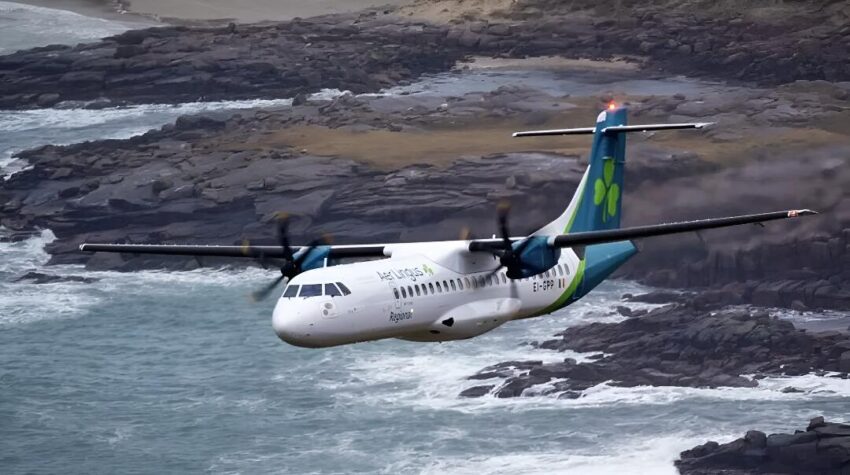Published on
September 15, 2025

In the heart of Ireland, a storm is brewing over Dublin Airport’s controversial passenger cap. Emerald Airlines, led by Conor McCarthy, is sounding the alarm, warning of a severe economic fallout. The cap, which limits air traffic, has raised urgent questions about Ireland’s future in the global aviation market. McCarthy has boldly labeled the move as Ireland’s own version of Brexit — a decision that could threaten the very foundation of the country’s economy. With tourism, international trade and thousands of jobs hanging in the balance, McCarthy’s passionate call for action demands immediate attention. Will the government heed his warnings, or will the cap remain in place, potentially crippling vital sectors? As Dublin Airport faces this critical crossroads, the stakes have never been higher for both Ireland’s aviation industry and its future prosperity. Stay tuned as we dive deeper into this developing story.
The Strategic Importance of Dublin Airport for Ireland’s Economy
Dublin Airport serves as a critical gateway for both tourism and trade in Ireland. According to McCarthy, the implications of limiting capacity at the airport go beyond just the aviation industry. Tourism, which is one of Ireland’s largest indigenous industries, heavily depends on air travel, with around 90% of international tourists arriving by air. Any reduction in flight options or increased costs associated with air travel is likely to have an adverse effect on Ireland’s tourism sector.
The economic consequences of the cap are already becoming apparent. McCarthy highlighted the potential for rising airfares, as a result of limited capacity and reduced competition. He noted that limiting the number of flights at Dublin Airport could drive prices up by €300 for return tickets during peak travel periods, a move that would hurt consumers and discourage international visitors from choosing Ireland as their destination.
The Impact on the Aviation Sector and Ireland’s International Connectivity
In addition to tourism, McCarthy stressed the significant impact the passenger cap could have on Ireland’s aviation sector and international connectivity. Dublin Airport plays a crucial role in connecting Ireland to the global market, making the restrictions a major concern for businesses relying on efficient air transport. McCarthy argued that limiting capacity at Dublin Airport would not only harm Irish businesses but also put Ireland at a competitive disadvantage in the international market.
Furthermore, the suggestion that flights could be redeployed to other airports, such as Cork or Shannon, was dismissed by McCarthy as impractical. He explained that forcing passengers to use alternative airports would be akin to repeating past mistakes, such as the ill-fated Shannon Transatlantic Stopover. Passengers who typically fly to Dublin do not wish to be rerouted to other airports and this could result in a decline in tourism and trade, both of which are vital to the Irish economy.
The Potential Loss of Jobs and Economic Value
Another concern raised by McCarthy was the risk of job losses and economic downturn. McCarthy pointed to a report by Dublin Airport, which highlighted that over 115,000 jobs are supported by the airport’s operations. He warned that if the passenger cap remained in place, it could lead to the loss of up to 20,000 jobs by 2030 and a reduction of €1.5 billion in gross value added to the Irish economy.
In this context, McCarthy underlined the need for government intervention, stating that the issue should be treated as a matter of national strategic importance. He expressed his concerns that, without urgent action, the long-term economic consequences of the passenger cap would be felt across a range of sectors, not just in aviation.
The Dublin-Donegal Service at Risk
McCarthy also raised concerns about the future of government-supported routes, such as the Dublin-Donegal service, operated by Emerald Airlines. He warned that, in a capacity-constrained environment, airlines may be forced to prioritize more profitable routes, leaving regional services like Dublin-Donegal at risk. This could further diminish Ireland’s domestic connectivity, particularly in less populated areas, which rely on affordable and accessible air travel.
The Dublin-Donegal service has played a vital role in connecting the capital with the northwest of Ireland, supporting both business and tourism traffic. However, if the capacity restrictions at Dublin Airport remain in place, the future of such routes could be jeopardized, with wider implications for regional development.
A Waste of Investment in Dublin Airport’s New Runway
McCarthy also criticized the recent €350 million investment in a new runway at Dublin Airport, completed in 2022. The new runway was intended to increase the airport’s capacity and support economic growth. However, McCarthy pointed out that without an increase in the passenger cap, this investment would effectively be wasted. He emphasized that the runway was approved by the Fingal County Council, which also imposed the 2007 Passenger Cap. The contradiction between the two decisions underscores the inefficiency of the current policy.
McCarthy concluded by reiterating the need for the government to act swiftly in removing the cap or, at the very least, suspending its enforcement until a thorough review of the situation can be completed. He stressed that any delay in addressing this issue would only exacerbate the economic damage and undermine Ireland’s position as an open and competitive economy.
Conclusion
The implementation of the Dublin Airport Passenger Cap has sparked significant concerns within the aviation industry, particularly for Emerald Airlines and the broader Irish economy. Conor McCarthy’s comments reflect a growing unease about the long-term economic consequences of restricting air travel capacity at Dublin Airport. From rising airfares to the potential loss of jobs and investment, the impact of the cap extends far beyond the aviation sector. As Ireland continues to recover from the effects of the pandemic, it is crucial for the government to recognize the strategic importance of Dublin Airport and take swift action to address these concerns.
Source- Emerald Airlines







